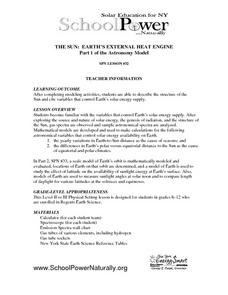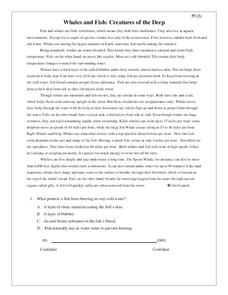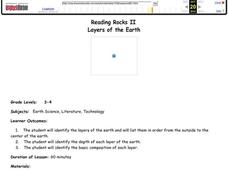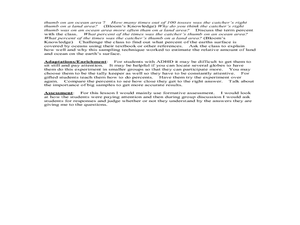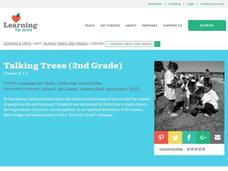NOAA
Mud is Mud...or is it?
We know that the type of soil varies by location, but does the seafloor sediment also vary, or is it all the same? Scholars compare photos of the seafloor from two different locations: the Savannah Scarp and the Charleston Bump. Through...
Curated OER
Plate Tectonics Day 4 Earth's Interior Structure and Convection Currents
Students introduced to the interior structure of the Earth. They explore how the Earth's interior is broken down according to both it's physical properties and it's chemical composition. Students explore how convection currents within...
Curated OER
The Sun: Earth's External Heat Engine - Part 1 of the Astronomy Model
Designed by School Power...NaturallySM, this lesson plan familiarizes advanced earth science and physics learners about the variables that affect our supply of solar energy. They examine gas spectra and perform calculations. There is an...
Houghton Mifflin Harcourt
Our Earth: Extra Support Lessons (Theme 8)
Plant or animal? As part of the Houghton Mifflin Harcourt thematic unit Our Earth, learners engage in activities and exercises that provide them with extra support to master the concepts in the unit.
Curated OER
The Sun: Earth's External Heat Engine Part 1 of the Astronomy Model
Students become familiar with the variables that control Earth's solar energy supply. They explore the source and nature of solar energy, the genesis of radiation, and the structrue of the Sun, gas spectra are observed and sample...
Curated OER
Our Special Planet Earth
Students explore what is special about our planet. They explore the various climates that are found on the planet Earth. Students create an advertisement to convince people why their favorite environment would be the best place to visit.
Laboratory for Atmospheric and Space Physics
Jupiter’s Relative Size
How do you properly illustrate the extreme size difference between two planets—Earth and Jupiter? With the help of jellybeans, of course! Create a scale model of Jupiter's mass compared to Earth using a fishbowl, 1,400 beans, and a dixie...
Curated OER
Earthquakes: Sixth Grade Lesson Plans and Activities
Young seismologists learn more about plate tectonics with a set of pre-lab, lab, and post-lab lessons plans on earthquakes. After exploring how waves travel through various materials, sixth graders record their observations and draw...
Curated OER
Plate Tectonics: Fifth Grade Lesson Plans and Activities
Fifth graders continue their investigation of the plate tectonics cycle with an exploration of the movement of Earth's crust. During the lab, young geologists conduct an experiment to discover the result of different types of stress...
Polar Trec
Where is the World's Water?
Scholars discover the amount of the Earth's water in various locations such as the ocean, ice, the atmosphere, etc. They then make a model of the how much water those percentages represent. Finally, analysis questions bring the concepts...
Curated OER
Whales and Fish: Creatures of the Deep
Practice comparing and contrasting details in informational text with a reading passage about whales. It explains the ways that fish and whales are similar, as well as the ways they are different, and specific characteristics of various...
Kenan Fellows
Terrarium in a Bottle: Modeling the Atmosphere, Greenhouse Effect, and Water Cycle
You've heard of farm to table ... but what about farm in classroom? Junior agriculturalists embark upon a two-week journey into the science of growing things. Based upon the classic terrarium in a two-liter experiment, the lesson goes...
MENSA Education & Research Foundation
Ecosystems
Explore the Earth's different ecosystems through four lessons, an assessment, and extension activities. Lessons include informative text and step-by-step instructions to apply knowledge in interactive, and thought provoking ways; such as...
Curated OER
Layers of the Earth
Students identify the layers of the Earth and complete activities for the topic. In this Earth layers lesson, students chart their ideas about the Earth's layers and view a PowerPoint for the topic. Students view an apple to learn about...
Curated OER
The Earth-Sun-Moon System
Third graders construct a model of the earth-sun-moon system using students as the sun, moon, and earth. They discuss ways that time is related to the movement of the earth and moon.
Curated OER
The Joy of a Garden-Earth Day
Students explore the purpose of a garden. In this Earth Day instructional activity, students read the story The Gardener and complete a Venn diagram comparing life in a city to farm life. Students discuss Earth Day and plant flowers in a...
Curated OER
What Part of the Earth's Surface is Covered by Oceans?
Third graders investigate oceans. For this Earth science lesson, 3rd graders predict how much of the Earth's surface is covered by oceans. Students determine if their predictions are accurate by throwing a globe to each other and then...
Curated OER
Earth, Moon, Mars Balloons
Students demonstrate size and orbits of Earth, Moon, and Mars. For this space science lesson plan, students will use balloons to show how the size and distance between the planets and satellite compare.
Curated OER
Talking Trees: Earth Day
Students complete a tree poster activity to learn about Earth Day, stewardship, and the environment. In this environmental stewardship activity, students read The Story of the Tree and discuss stewardship with trees. Students act out...
Curated OER
Edible Four-Layer Earth
This lesson is designed to come after students have studied about the four main layers of the earth. They may relate the size of the sections to known objects such as the mantle to the size of a grapefruit and the outer core to the size...
Curated OER
Crashed on the Moon
Young scholars compare and contrast the environments of the moon and the earth. They discover how the differences might change one's daily activities.
Curated OER
The Ocean Floor
Practice reading comprehension by approaching oceanography through 2 pages of informational text. The text compares the ocean floor to the Grand Canyon to gives students perspective, and gives a brief coverage of the earth's crust and...
Curated OER
Mineral Matters
Students work in a team to use the ProScope Digital USB Microscope and a computer to collect microscopic images from a variety of mineral specimens. They compare specimens and determine how they are alike and different by comparing their...
Curated OER
The Search for El Nino
Sixth graders complete an El Nino scavenger hunt. In this earth science lesson plan, 6th graders describe the conditions that create El Nino and compare it to normal condition. They discuss how this phenomenon affects marine ecosystem.




